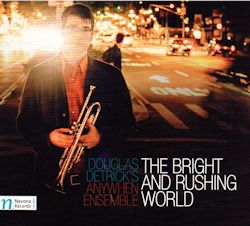1. The door is open
2. And you watch as he goes out
3. A seeker, insubmissive
4. Into the bright and rushing world
5. Who, over years in your care
6. You never thought to give a name
7. You gasp and ask aloud
8. How can you live without a name
9. A question so weightless it floats away
10. On the wind of his leaving
Douglas Detrick - Trumpet
Hashem Assadullahi - Alto sax, soprano sax
Shirley Hunt - Cello
Steve Vacchi - Bassoon
Ryan Biesack - Drums
Douglas Detrick is a 27-year-old composer, trumpeter, arts consultant and rising star, based in Oregon in the United States. This recording, a suite for
five musicians, was sponsored by the Chamber Music America's 2011 New Jazz Works: Commissioning and Ensemble Development programme. The entire suite was
composed by Detrick. There are shades here of the (abortive?) “Third Stream”, beloved of Gunther Schuller, which looked to combine elements of jazz with
western classical music.
Essentially, this is chamber jazz. The titles, read one after another, form a narrative. The door is open features melancholy trumpet in an
atmospheric piece. And you watch as he goes out has some lovely cello playing as well as a strong ensemble sound and unobtrusive, delicate
drumming. A seeker, insubmissive (I'm at a loss as to what the latter word means!) presents a repetitive theme involving interweaving lines from
bassoon (a thoughtful solo from Steve Vacchi), cello, sax and trumpet. Into the bright and rushing world is, some of the time, discordant. Who, over years in your care is easy on the ear with individual moments of merit (a pure-toned soprano sax, for instance) but the real strength
lies in the way the instruments merge to provide a rich mini-orchestral sound. You never thought to give a name is oblique and more classical in
character, though the muted trumpet has a more authentic jazz quality and, as is the case throughout the disc, drummer Ryan Biesack is flawless. You ask and gasp aloud finds Biesack again prominent. How can you live without a name? has a mournful theme but, once more, the interplay
between the musicians is striking. A question so weightless it floats away, the longest track at almost twelve minutes, is my favourite on the
album, despite a skittering interlude. Everyone plays their part – the vibrancy of the cello, the purity of the trumpet, the rhythmic contribution of the
drums, the deep notes of the bassoon (unusual but not unknown in jazz), the alto sax, probably heard to best effect on the disc at this point – it all
grows in intensity though there are occasional quieter moments. On the wind of his leaving is limpid, even beautiful, and is a fitting finale.
My guess is that this will appeal to the ECM/ACT constituency in particular. Undoubtedly these are fine musicians, it's an interesting line-up and they
collaborate well. It does, however, raise the question of where jazz ceases to be jazz and passes over into contemporary/classical music. A further comment
is necessary. Both in Douglas Detrick's playing and in the overall sound of the Anywhen Ensemble, I was reminded of Kenny Wheeler's music on a number of
discs I own and that's no mean compliment.
James Poore
